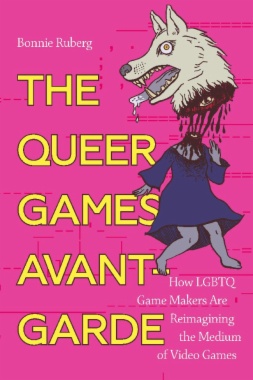In The Queer Games Avant-Garde, Bonnie Ruberg presents twenty interviews with twenty-two queer video game developers whose radical, experimental, vibrant, and deeply queer work is driving a momentous shift in the medium of video games. Speaking with insight and candor about their creative practices as well as their politics and passions, these influential and innovative game makers tell stories about their lives and inspirations, the challenges they face, and the ways they understand their places within the wider terrain of video game culture. Their insights go beyond typical conversations about LGBTQ representation in video games or how to improve “diversity” in digital media. Instead, they explore queer game-making practices, the politics of queer independent video games, how queerness can be expressed as an aesthetic practice, the influence of feminist art on their work, and the future of queer video games and technology. These engaging conversations offer a portrait of an influential community that is subverting and redefining the medium of video games by placing queerness front and center.
Interviewees:
Ryan Rose Aceae, Avery Alder, Jimmy Andrews, Santo Aveiro-Ojeda, Aevee Bee, Tonia B******, Mattie Brice, Nicky Case, Naomi Clark, Mo Cohen, Heather Flowers, Nina Freeman, Jerome Hagen, Kat Jones, Jess Marcotte, Andi McClure, Llaura McGee, Seanna Musgrave, Liz Ryerson, Elizabeth Sampat, Loren Schmidt, Sarah Schoemann, Dietrich Squinkifer, Kara Stone, Emilia Yang, Robert Yang
- Cover
- Contents
- Acknowledgments
- Introduction :::: Reimagining the Medium of Video Games
- Part I. Queer People, Queer Desires, Queer Games
- One :::: Dietrich Squinkifer: Nonbinary Characters, Asexuality, and Game Design as Joyful Resistance
- Two :::: Robert Yang: The Politics and Pleasures of Representing Sex between Men
- Three :::: Aevee Bee: On Designing for Queer Players and Remaking Autobiographical Truth
- Part II. Queerness as a Mode of Game-Making
- Four :::: Llaura McGee: Leaving Space for Messiness, Complexity, and Chance
- Five :::: Andi McClure: Algorithms, Accidents, and the Queerness of Abstraction
- Six :::: Liz Ryerson: Resisting Empathy and Rewriting the Rules of Game Design
- Part III. Designing Queer Intimacy in Games
- Seven :::: Jimmy Andrews + Loren Schmidt: Queer Body Physics, Awkwardness as Emotional Realism, and the Challenge of Designing Consent
- Eight :::: Naomi Clark: Disrupting Norms and Critiquing Systems through “Good, Nice Sex with a Tentacle Monster”
- Nine :::: Elizabeth Sampat: Safe Spaces for Queerness and Games against Suffering
- Part IV. The Legacy of Feminist Performance Art in Queer Games
- Ten :::: Kara Stone: Softness, Strength, and Danger in Games about Mental Health and Healing
- Eleven :::: Mattie Brice: Radical Play through Vulnerability
- Twelve :::: Seanna Musgrave: “Touchy-Feely” Virtual Reality and Reclaiming the Trans Body
- Part V. Intersectional Perspectives In/On Queer Games
- Thirteen :::: Tonia B****** + Emilia Yang: Making Games about Queer Women of Color by Queer Women of Color
- Fourteen :::: Nicky Case: Playable Politics and Interactivity for Understanding
- Fifteen :::: Nina Freeman: More Than Just “the Woman Who Makes Sex Games”
- Part VI. Analog Games: Exploring Queerness Through Non-Digital Play
- Sixteen :::: Avery Alder: Queer Storytelling and the Mechanics of Desire
- Seventeen :::: Kat Jones: Bisexuality, Latina Identity, and the Power of Physical Presence
- Part VII. Making Queer Games, Queer Change, and Queer Community
- Eighteen :::: Mo Cohen: On Self-Care, Funding, and Other Advice for Aspiring Queer Indie Game Makers
- Nineteen :::: Jerome Hagan: Are Queer Games Bringing “Diversity” to the Mainstream Industry?
- Twenty :::: Sarah Schoemann: The Power of Community Organizing
- Afterword :::: The Future of the Queer Games Avant-Garde
- Appendix :::: Queer Indie Games to Play at Home or in the Classroom
- Notes
- Bibliography
- Index
- A
- B
- C
- D
- E
- F
- G
- H
- I
- J
- K
- L
- M
- N
- O
- P
- Q
- R
- S
- T
- U
- V
- W
- Y
- Z

